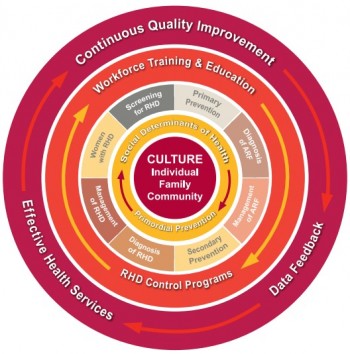Culture and Workforce
The importance of culture and its influence on the provision of health care is not well understood. This is evident in populations bearing the greatest burdens of acute rheumatic fever (ARF) and rheumatic heart disease (RHD), and the healthcare providers tasked with managing these conditions.
Culturally safe care
Everyone receiving healthcare has a right to feel culturally safe, and healthcare providers have an obligation to deliver culturally competent care. Healthcare providers must be prepared to translate care delivery to patients with diverse cultural backgrounds, expectations and needs.
In Australia, the vast majority of ARF and RHD occurs in Aboriginal and Torres Strait Islander peoples.1,2 Many Aboriginal and Torres Strait Islander peoples have a holistic view of health that is not necessarily met by the biomedical model of healthcare. For these people, health is not just the physical wellbeing of an individual, but refers to the social, emotional, and cultural wellbeing of the whole community.
Cultural and structural competencies in healthcare are necessary to close the evidence-practice gap.

A socio-ecological model for ARF and RHD (above) reflects the complex and dynamic interrelationships between systems, people, and the clinical care areas. In this model, the individual is central, surrounded by culture, family, and the wider community. This has a direct influence on how quality evidence-based care is received and adopted. Culturally safe care includes
- respect for cultural diversity, rights, views, values, and expectations.
- Aboriginal and Torres Strait Islander health workforce participation as an essential element within all health workforce initiatives, settings, and strategies.
- effective, comprehensive, and culturally safe and responsive approaches to service delivery that have the flexibility to reflect the local context and the diversity of Aboriginal and Torres Strait Islander communities.
- workforce initiatives and processes within the wider health system that embed, acknowledge and respect Aboriginal and Torres Strait Islander holistic views of health that includes attention to physical, spiritual, cultural, emotional, and social wellbeing, community capacity and governance.
- cultural knowledge, expertise and skills of Aboriginal and Torres Strait Islander health professionals reflected in health services models and practice.
- the ability of health care providers to reflect on their own culture and actions and accept other cultures.
The importance of workforce
The health system is responsible for the delivery of quality healthcare to Aboriginal and Torres Strait Islander peoples that is culturally appropriate and clinically sound.3
The health workforce must therefore be adequately resourced and supported, with considerations for the complex needs of Aboriginal and Torres Strait Islander peoples, especially those living in remote areas.4 It is equally important to identify barriers and enablers within the current workforce that impact care.5 When the workforce is culturally safe this can improve clinical outcomes.
The presence and integration of Aboriginal and Torres Strait Islander staff across the entire care system is essential for effective care. An integrated Aboriginal and Torres Strait Islander workforce which is adequately trained and supported is one of the key drivers for successful health programs.
- 1. Katzenellenbogen JM, et al Contemporary Incidence and Prevalence of Rheumatic Fever and Rheumatic Heart Disease in Australia Using Linked Data: The Case for Policy Change. J Am Heart Assoc. 2020;9:e016851 View Source
- 2. Australian Institute of Health and Welfare (2022). Acute rheumatic fever and rheumatic heart disease in Australia 2016–2020, catalogue number CVD 95, AIHW, Australian Government. View Source
- 3. South Australian Health and Medical Research Institute. National Safety and Quality Health Service Standards user guide for Aboriginal and Torres Strait Islander health. Sydney, 2017.
- 4. Gupta TS, Reeve C, Larkins S, Hays R. Producing a general practice workforce: lets count what counts Australian Journal of General Practice 2018; 47(8): 514-7 View Source
- 5. Liaw ST, Hasan I, Wade V, et al. Improving cultural respect to improve Aboriginal health in general practice: A multi-methods and multi-perspective pragmatic study. Australian Family Physician 2015; 44(6): 387–392. View Source
